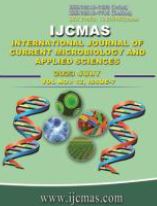


 National Academy of Agricultural Sciences (NAAS)
National Academy of Agricultural Sciences (NAAS)

|
PRINT ISSN : 2319-7692
Online ISSN : 2319-7706 Issues : 12 per year Publisher : Excellent Publishers Email : editorijcmas@gmail.com / submit@ijcmas.com Editor-in-chief: Dr.M.Prakash Index Copernicus ICV 2018: 95.39 NAAS RATING 2020: 5.38 |
Aquaculture is the fastest expanding sector of animal food production and has a lot of potential as a long term solution for global food security. The ability to controllinggrowth, reproduction and sex is crucial aspects of aquaculture for increasing aquaculture production. Many natural and synthetic hormones are used in aquaculture.This present review focused on the use of various hormones in fish breeding, sex reversal, growth promotion and immune boosting in aquaculture. In fish breeding, pituitary gland extract and gonadotropic releasing hormone analogues are commonly used to induce spawning in captive condition and produce good quantity and quality seed throughout the year. Estrogen and androgen are the mostly used in sex reversal of fish when one gender of species has the potential to grow faster and bigger than other gender.Administration of thyroid hormone and tryptophan helps fish grow bigger and less stressed. In order to increase food safety and limit environmental impact, these hormones should be used with caution in aquaculture. In order to increase food safety and limit environmental impact, these hormones should be used with caution in aquaculture. In order to increase food safety and limit environmental impact, these hormones should be used with caution in aquaculture.
 |
 |
 |
 |
 |